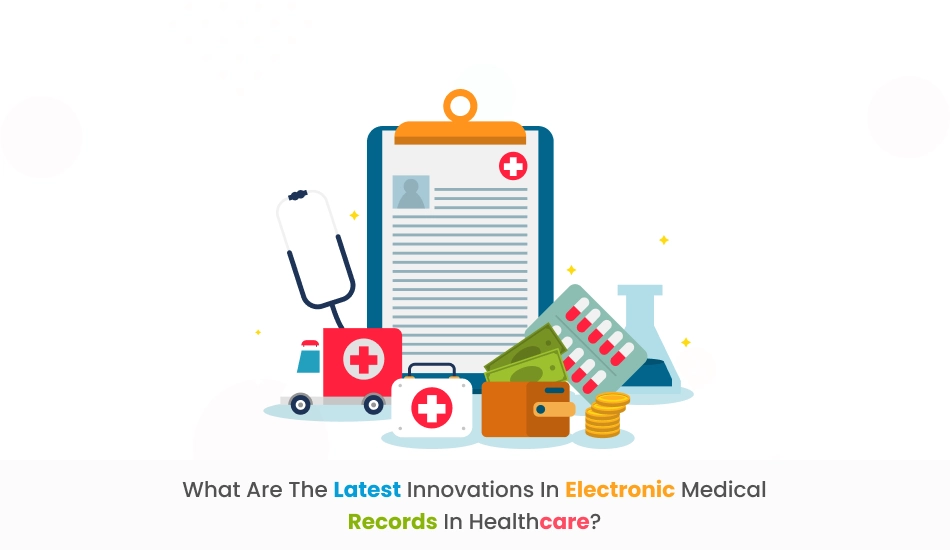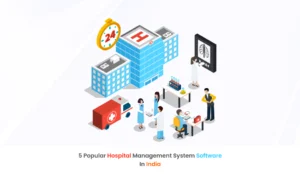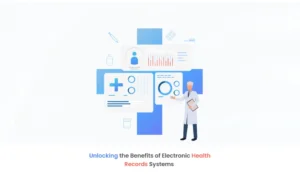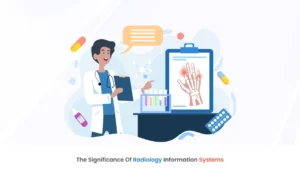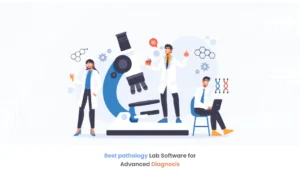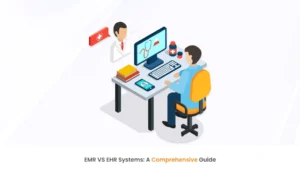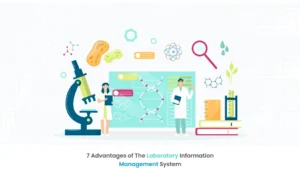Quick Summary
Medical records are the core part of the healthcare industry and managing these records is a troublesome and time-consuming task. Medical staff invested most of their time in maintaining paper records. To resolve this challenge, electronic medical records come into the picture with their latest and advanced technologies for the smooth functioning of medical operations.
Introduction
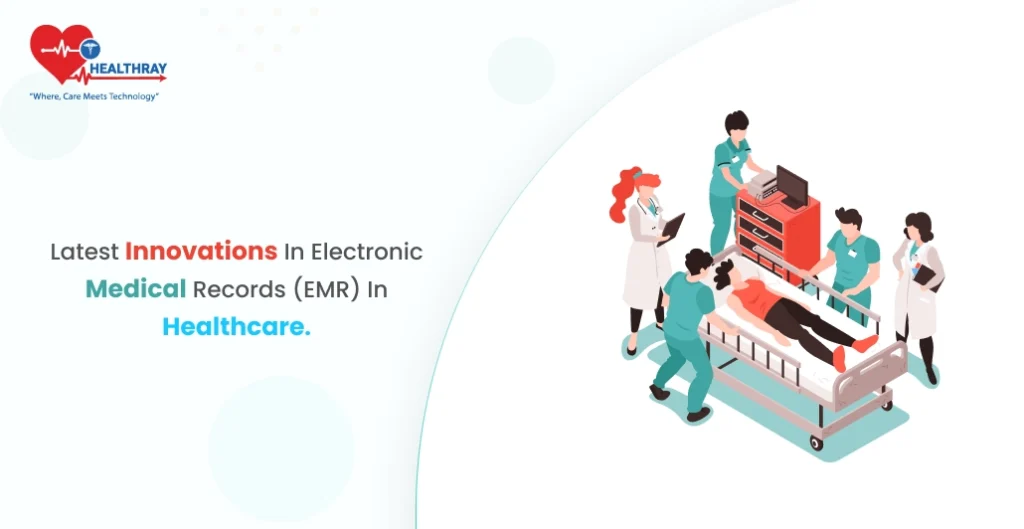
Paper medical records are difficult to manage, record, and maintain. Requires lots of effort, and time to prepare physical documents still, there are chances of human error. There are multifaceted risks associated with paper records such as breaches of patient confidentiality through loss or theft.
Furthermore, it involves various hospital costs such as warehouse costs, legal costs, recruitment costs, and huge administrative costs. To cope with the current healthcare landscape, it’s predominant to implement the best EMR Software like Healthray. This AI-powered tool has immense power to decrease healthcare costs. Subsequently, increases hospital revenue.
It provides a complete hospital solution, inclusive of all medical departments. These departments incorporate a clinical department, financial department, accountancy department, patient department, out-patient department, in-patient department, radiology department, and operation-theater department. Consequently, it reduces hospital expenses and aids in workflow optimization.
Key Benefits of Electronic Medical Records in Healthcare
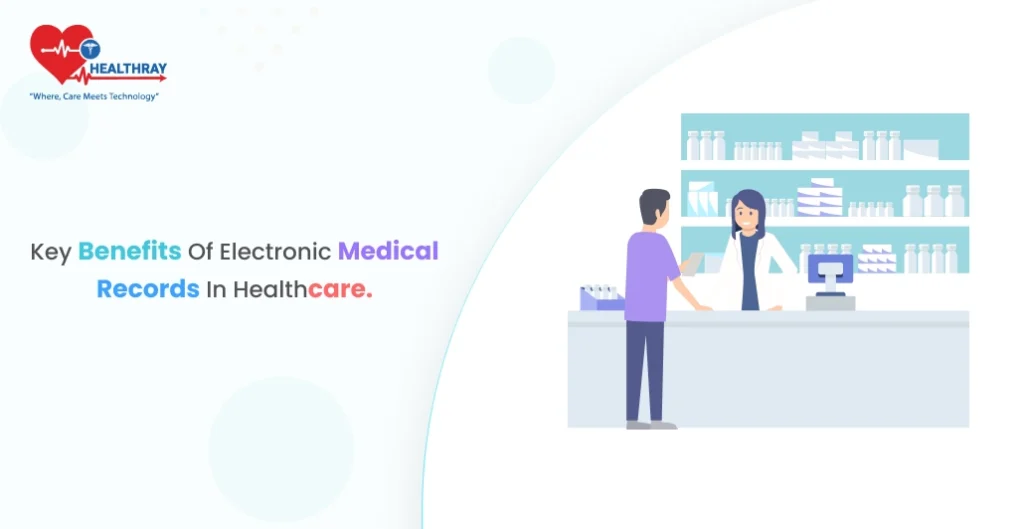
Electronic Health Record is a modern tool for efficiently conducting hospital tasks. It has the biggest advantage over paper-based medical records. Moreover, Healthray is a standout hospital software for advancing medical facilities to the next level. The Electronic Medical Record (EMR/EHR) Solution has uncountable benefits, let’s discuss a few of them :
Reduced clinical costs :
- Formerly, electronic health record systems had basic technology. Therefore they don’t have advanced functionalities for improving healthcare effectiveness.
- In modern electronic health records have the immense potency to simplify clinical tasks with a user-friendly interface and better management tools.
- Previously, it was limited to a few digital entries, but now this single software supports various hospital departments from administrative to operation theater departments.
- Streamlining hospital operations leads to reduced hospital expenses such as recruitment costs, lower training costs, and reduced human efforts. Also, minimize medical errors.
Time-efficient platform :
- Formerly, many physicians implemented EMR systems but they still use paper-based records. Because it has numerous disadvantages which are addressed by the new EMR system.
- Electronic charting is better than paper records as it is easy to observe and analyze patient records. Subsequently, it supports accurate inpatient diagnoses.
- With the current Electronic Medical Record system, it is easy to tackle operational work and improve communication among staff managers.
- Supports managing healthcare resources efficiently and maintaining patient records effectively which requires less human effort. Therefore, it saves lots of physicians and staff time.
Wider accessibility :
- Previously, electronic medical records had limited healthcare accessibility but the latest EMR system has the potential to expand healthcare services from urban cities to remote areas.
- It is more advantageous for old age people, disabled people, and children. Moreover, there are various challenges faced in accessing medical services such as physical barriers, transportation, and financial barriers.
- Patients can monitor and observe their healthcare from their homes or any remote location through their digital devices. Therefore, easy access empowers patients to maintain healthier surroundings.
- It reduces the risk of severe diseases such as high blood pressure, heart attack, etc. Additionally, minimizes patient expenses which are incurred on transportation and accommodation.
Expand medical services :
- Most healthcare professionals have a dream to set up their hospitals. However, it requires lots of money, effort, and time.
- Formerly, Electronic medical records cannot interact with patients remotely. New EMR system building stronger relationships between physicians and patients.
- Ease to share medical information among healthcare specialists and strengthen their relationship. Consequently, supports expanding health care services at a large scale.
- Facilitate virtual monitoring which helps doctors to earn money by providing medication and treatment advice. Moreover, the best part is that they can earn from patients or other medical providers.
Simplified prescription procedure :
- Digital technology in healthcare maintains electronic patient records such as immunization records, symptoms, and previous medication information with vital signs.
- It simplifies prescription procedures from the centralization patient platform which includes the patient’s medical history. Observing a patient’s physical condition, it is easier for a doctor to write a prescription.
- Extensive effort is required to comply with prescription regulations which are persistently changing. On the other hand, it is easy to comply with regulations with modern EHR systems.
- Minimizes the use of physical storage space for maintaining patient history and other important documents.
The Latest innovation in Electronic Health Records in Healthcare
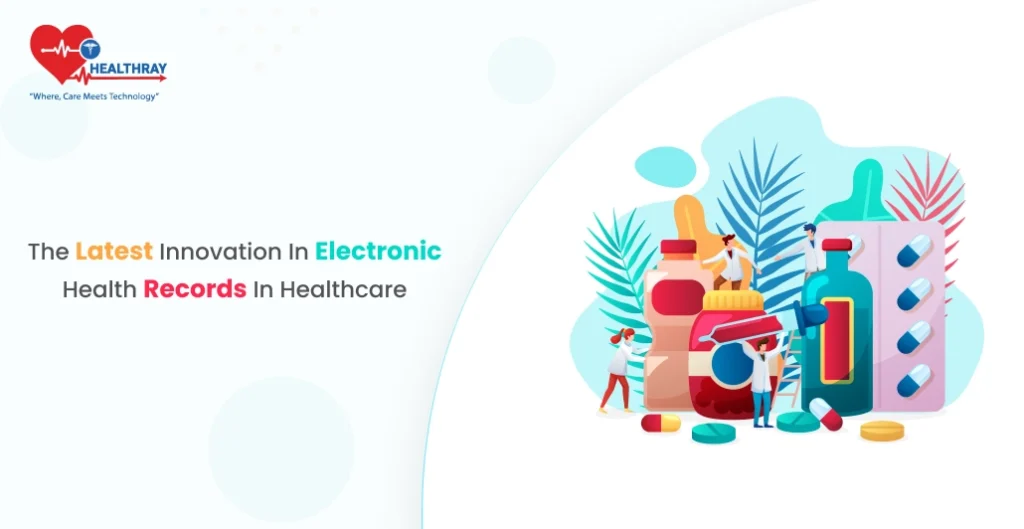
Most hospitals select electronic medical records for their versatile functionalities and ease of their medical work. Moreover, it handled whole hospital operations from managing patient records to maintaining inventory levels. Incorporates the latest innovation in electronic health records for improving healthcare services and complete elimination of paper records. Let’s delve into the latest innovation :
Remote accessibility :
Formerly, it was hard to connect with patients from any location, and at that time it was a dream to have a single platform for healthcare providers and patients. With Healthray’s electronic health records, everything seems possible in the hospitalization field. Moreover, this platform provides video consultation, virtual monitoring, and other features. Here are a few advantages of remote accessibility :
- Increasing patient experience
- Minimizes patient’s expenses.
- Support in emergencies.
- Improving medical practices.
- Minimizes Healthcare costs.
AI integration :
- The incorporation of artificial intelligence (AI) solves complex medical data structures which is impossible through basic electronic medical record platforms.
- A basic Electronic Medical Record focuses on recording data in digital format, whereas AI-enabled EMR centralizes data for better clinical and treatment decision-making.
- A foundation Electronic Medical Record able to access medical records to patients. On the other hand, AI-enabled EMR systems have the vast capability to integrate with various medical departments.
- Consequently, it saves time for enhancing patient care and improving administrative efficiency.
Step towards digital era with our healthcare solution
Revamp your hospital facilities and embrace change for better healthcare management. Ease in managing and organizing large medical datasets leads to effective analysis. Seize the opportunity now!
Virtual health consultation :
Virtual health consultation enables healthcare professionals to provide treatment from their home or any other location. Moreover, healthcare providers can earn extra income from providing remote consultations. Subsequently, it minimizes patient medical expenses. Let’s delve into the advantages of virtual health consultation :
- Enhanced medical practice.
- Reducing the need for personal visits to doctors.
- Persistently patient care.
- Eradicate paper charting.
- Enhanced patient safety.
Patient management :
Electronic medical records consolidate patient information, organizing them in a structured format that can be fetched easily through healthcare staff. Consequently, it reduces the need for filing cabinets, and minimizes large amounts of human effort. Let’s take a look below at the patient management advantages :
- Improving health outcomes
- Accumulated patient data
- Ease in sharing a patient’s chart.
- Reducing hospital staff efforts.
- Aids in medication discovery.
Supports in medical research :
Modern electronic health records have extensive abilities that help in generating medical reports and medical information in a concise format with graphical elements. Consequently, it is easy to understand and support medical research for efficient medical treatment. The benefits of medical research are :
- Predicting future disease.
- Efficient treatment outcome.
- Minimizes medical research costs.
- Aids in formulating medical policy.
- Supports the growth of the economy.
Complies with medical regulations :
- There are numerous medical authorities such as the National Health Authority (NHA), HIPAA, and WHO (World Health Organization) which are framing medical policies.
- These regulations are necessary to follow for maintaining data security, preventing legal risks, enhancing patient safety, and improving quality care. Therefore, it simplifies the healthcare staff’s work tasks.
Electronic Payment :
Electronic payments are a convenient mode of payment for patients. It saves entire medical financial transactions in one place. Therefore, contribute to preparing a financial medical budget. There are many advantages of electronic payment. However, let’s delve into the benefits of electronic payment :
- Time efficient process
- Minimizes administrative expenses.
- Payment security.
- Eliminate conflict risks.
- Reducing manual errors.
The Challenges of the Paper Records System in Healthcare
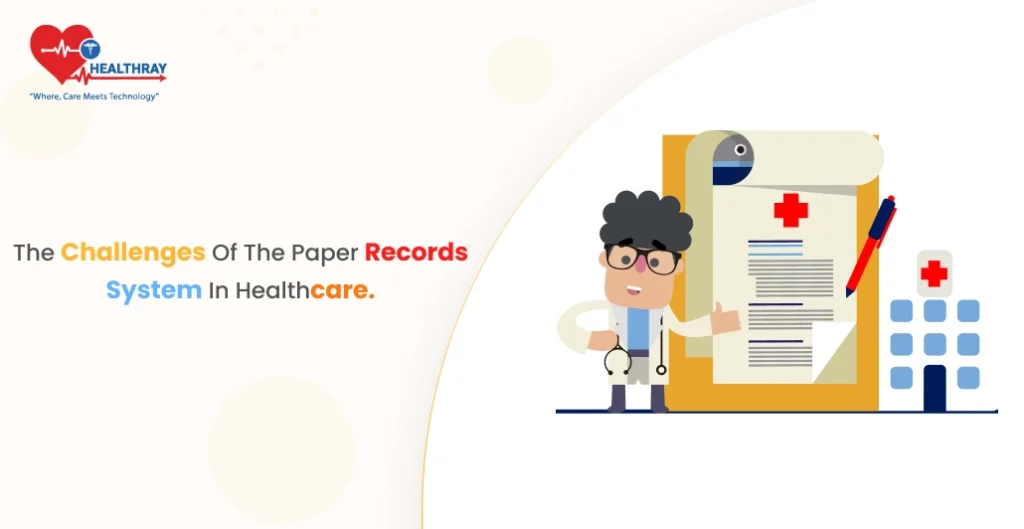
Paper record systems are vanishing day by day and moving towards a sustainable environment through less use of natural resources. Formerly, electronic medical records were not more efficient and still, there was a requirement of paper charts. Therefore, implementing former electronic medical records is not worthwhile.
On the other hand, modern Electronic Medical Records have full-fledged AI technologies, eliminating the use of filing cabinets and paper files. All data in the format of electronic records make it easier to comply with healthcare authorities such as the National Health Authority (NHA) and other privacy regulations. Also, eradicate the hurdle of illegible handwriting.
This advanced platform reduces overall healthcare costs such as medical research costs, and physical document expenses, eliminating patient transportation costs and record-keeping costs. However, not all EMRs have advanced features, but there is one comprehensive electronic medical record software called Healthray, that facilitates a versatile range of modern features.
Conclusion
Formerly, Electronic medical records in healthcare did not have advanced functionalities which are provided through AI electronic medical record software with their latest innovation. Moreover, there are numerous benefits of electronic medical records such as reducing healthcare costs, saving time, and expanding medical services. The latest innovation on electronic medical records has had a tremendous effect on the medical industry. Therefore, it improves coordination among medical practitioners, fully eliminates the medical paper chart system, and enhances patient care.
